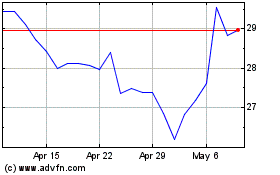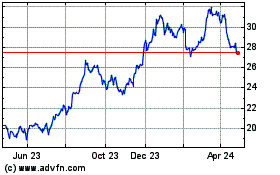UBS's Top Executives Criticize Negative Interest Rates
May 10 2016 - 8:10AM
Dow Jones News
ZURICH—The top two executives at Swiss banking giant UBS Group
AG teamed up Tuesday to blast the negative interest rate
environment brought on by the easy money policies of central banks,
an indication that patience is wearing thin in some quarters over
these emergency measures.
"The introduction of negative interest rates—now not only in
Switzerland, but also in large parts of Europe and in Japan—is an
extraordinary measure and should only be used in extraordinary
times," said UBS Chairman Axel Weber in remarks to the bank's
annual shareholders meeting.
"We can all only hope that the times of such drastic measures by
the central bank pass as quickly as possible," said Mr. Weber, a
former Bundesbank president who has been critical in the past about
negative interest rates. "Unfortunately, I have to say,
unfortunately, there is little indication that negative interest
rates will soon be a thing of the past."
Faced with very low inflation, or even falling prices, more
central banks have resorted to negative rates on bank deposits
stored with them. Switzerland's central bank has been particularly
aggressive with this tool, having maintained a -0.75% deposit rate
since January 2015. Central banks in the eurozone, Denmark, Sweden
and Japan have also gone this route.
One consequence of negative rates is that they make a country's
assets less attractive to investors, which may weaken the currency
and boost both exports and prices of imported goods.
But it poses problems for financial institutions that face
penalty rates from their central banks while being constrained from
passing negative rates on to retail customers.
"Because of low and even negative interest rates, we and the
whole industry are now presented with a frankly absurd question: do
we still really want to take on client assets when doing so costs
the bank money—and when we have to back up liquid assets with an
unreasonably large amount of capital?" said UBS Chief Executive
Sergio Ermotti. "I have my doubts as to whether this is good for
the financial system and the economy."
Mr. Ermotti noted that UBS has already been forced to pass along
negative rates to businesses and increase the rates it charges on
some loans. "If the conditions remain as they are or grow worse, we
will have to consider extending these measures to very wealthy
clients and increasing interest rates on loans yet higher," he
said.
Write to Brian Blackstone at brian.blackstone@wsj.com
(END) Dow Jones Newswires
May 10, 2016 07:55 ET (11:55 GMT)
Copyright (c) 2016 Dow Jones & Company, Inc.
UBS (NYSE:UBS)
Historical Stock Chart
From Aug 2024 to Sep 2024

UBS (NYSE:UBS)
Historical Stock Chart
From Sep 2023 to Sep 2024
